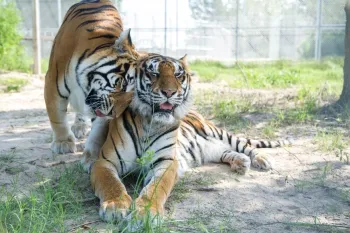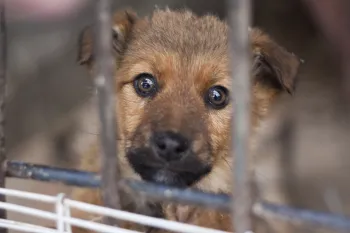Massachusetts House Bill 4915, which bans using primates, bears, big cats, giraffes and elephants in circuses, was just signed into law by Massachusetts Gov. Maura Healey after it unanimously passed the House and passed the Senate on a voice vote. Here, my colleague Nicole Paquette shares her thoughts on two decades of activism on this front.
I’ll never forget the first state bill I worked on to ban the use of wild animals in circuses and traveling shows. It was in 2001 in Massachusetts, and its introduction by state Sen. Robert Travaglini followed years of headlines exposing the dark side of the big top.
In those years, elephants in circuses had even escaped and rampaged in the streets, with some gunned down by law enforcement officials. They were dying from tuberculosis. Trainers were mauled and even killed by tigers, sometimes in front of spectators. Videotapes of behind-the-scenes beatings of animals surfaced, some showing elephants being beaten with bullhooks, which inflict pain, lacerations and puncture wounds.
I knew that we had to move boldly to try to stop this cruelty, especially given the fierce opposition from the circus industry, which downplayed these chronic horrors as isolated incidents. This became one of my passions after I met Pat Derby, a one-time wild animal trainer and founder of the Performing Animal Welfare Society, while in law school.
Over the years, the Massachusetts circus bill underwent several iterations and would be introduced year after year, championed by a bipartisan group of legislators in the state. Other states and localities around the country also took on this issue, building momentum and increasing pressure on circuses by passing bans on vicious training tools or outright prohibitions on the use of wild animals in traveling shows.
Some in the industry adapted to public demand for cruelty-free entertainment and passage of laws restricting mistreatment and use of wild animals. After years of clandestine ops targeting animal protection groups, gaslighting and defending the indefensible—including attempting to rebrand violent use of bullhooks as “guiding,” or equating constant chaining of elephants to leashing a dog, Ringling Bros. and Barnum & Bailey Circus, UniverSoul Circus and others voluntarily eliminated animal acts. I cried tears of joy when I heard the news of Ringling’s decision. In the thick of this campaign, through so many years, I had never quite been able to envision such an ending.
So, imagine my excitement today when, after more than 20 years, the Massachusetts legislature passed its circus bill, making it the 11th state to restrict the use of wild animals in circuses and other traveling shows. Earlier this year, Maryland’s governor signed a similar bill into law.
These outcomes show the rewards of perseverance, resilience and the inestimable value of working together with other groups in focused coalitions. We were honored to campaign alongside advocates, wild animal sanctuaries and numerous local, state and national animal protection organizations—many of them over decades—to get this bill passed. No matter what happened, we never gave up fighting to protect and free captive wild animals from the abuse and cruelty they suffered in this industry.
We relied heavily on research and investigations to make our case. An HSUS undercover investigation of Ryan Easley’s ShowMe Tigers act revealed violent training and intense confinement. Digging into the history and biographies of individual animals used in the industry, we learned more about Beulah, an elephant who was taken to the U.S. as a juvenile and sold to an exhibitor. Instead of growing up with her mother, she was confined, transported from state to state, giving rides to fairgoers and circusgoers for over four decades. She collapsed in 2019 in a parking lot at a Massachusetts agricultural fair and died from blood poisoning caused by a uterine infection that had plagued her for years. Beulah’s owner and federal regulators knew she was sick, yet the owner still forced her to travel and entertain paying crowds.
Shriners: Adopt an animal-free circus policy
Urge Shriners International to adopt a humane, modern business model by prohibiting local chapters from using sensitive wild animals in their circuses.
Humanity has learned the hard way that using stressed and unpredictable wild animals in traveling shows poses a risk to public safety. In April 2024, an elderly elephant named Viola, belonging to Carson & Barnes Circus, escaped from a circus in Butte, Montana. Viola knocked down a fence, crossed through traffic, passed a casino and paused on a residential lawn before she was re-captured by handlers with bullhooks. Despite two previous escapes and injuries, Carson & Barnes continues to keep Viola on the road, showing no regard for her safety or the public's.
It’s past time that exhibitors accept that exploiting animals in this way is not just inhumane, but bad for business. Bullying wild animals, who in their natural lives enjoy freedom, choice and autonomy, into performing demeaning tricks with cruel devices such as bullhooks, whips and electric prods is unacceptable. There has been a clear shift in public attitudes, which explains why nearly 200 localities in 37 states have passed restrictions governing the use of wild animals in circuses and traveling shows. Massachusetts now joins 10 other states in enacting similar measures.
Even so, many circuses and traveling shows continue to exhibit and use wild animals. Chronic underenforcement of the federal Animal Welfare Act, which regulates such use, has prompted our decision to pursue stronger laws prohibiting these acts at the state and local levels. It is these laws that will push the remaining circuses and traveling shows, including many Shrine circuses, into the future of humane, 21st century entertainment.
You can help to end wild animal acts in your community by pressing Shriners International to prohibit chapters from using wild animals in circus acts.
The story of the Massachusetts law shows that victories may not always come quickly. We will not give up until the circus industry abandons its cruelty and leaves wild animals in peace, and we will win this fight. Let’s keep the momentum going.
Nicole Paquette is chief programs and policy officer of the HSUS.

